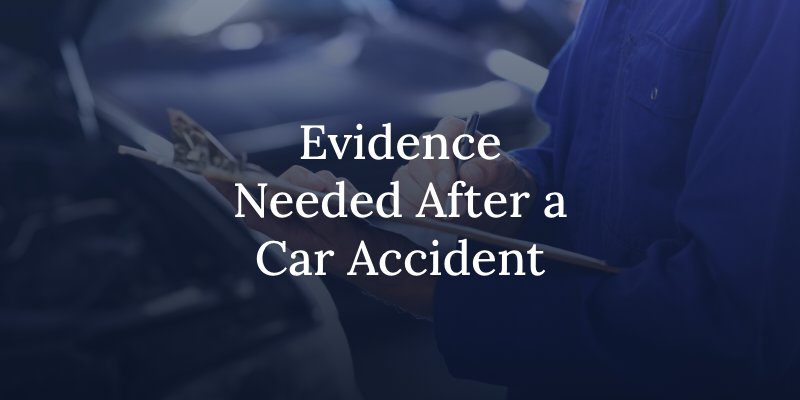What Evidence Do You Need After a Car Accident?
After a car accident, gathering evidence is crucial for insurance claims and potential legal action because it provides a clear, objective record of what happened, who was involved, and the extent of damages or injuries. Proper documentation of the accident can protect your rights, help establish fault, and ensure that you receive fair compensation for any injuries or property damage.
Why Do I Need Evidence After a Car Accident?
Insurance companies rely on detailed information to evaluate claims, and having thorough evidence strengthens your position during settlement negotiations. If the case escalates to a lawsuit, the collected evidence will be vital in proving liability and determining compensation in court. Without sufficient evidence, the claims process could be prolonged, your compensation may be reduced, or your claim could be denied by an insurance adjuster altogether.
Additionally, gathering evidence immediately after the accident ensures accuracy while the details are still fresh in your mind. Over time, memories fade, and physical evidence can be altered or disappear entirely. For example, road conditions or debris may change, witness availability may decrease, and surveillance footage may be overwritten.

What Evidence Do I Need to Gather After a Car Accident?
Here’s a list of the key evidence you should collect:
Accident Scene Photos
Photos you should get include:
- Vehicles: Take photos of all vehicles involved, including damage, license plates, and positions.
- Surroundings: Capture the broader scene, including road signs, traffic lights, skid marks, and any obstructions.
- Weather and Road Conditions: Document weather, lighting, and road conditions, like rain or potholes.
- Injuries: If applicable, take photos of any visible injuries sustained in the accident.
Proof of Time and Location
If possible, ensure your photos have timestamps.
Use receipts (from gas stations, for example) or GPS records to prove your location at the time of the accident.
Police Report
Request a copy of the police report. It includes details about the accident, statements from involved parties, and the officer’s initial assessment of fault.
Witness Statements
Collect names, phone numbers, and addresses of witnesses. Ask witnesses for their version of events, and record their statements if possible.
Driver and Vehicle Information
- Insurance: Gather the insurance details of all drivers involved (company name, policy number).
- Driver’s License: Take note of the driver’s license number, full name, and contact details.
- Vehicle Details: Document vehicle make, model, license plate number, and registration information.
Medical Records
Keep a record of all medical visits, treatments, and diagnoses related to the accident. These records are crucial for proving injury claims.
Save copies of all bills and receipts for treatments, medications, and therapies.
Repair Estimates and Invoices
Get repair estimates from a mechanic or body shop for damage to your vehicle. Keep all receipts for any repairs made.
Communication Records
Document any communication with insurance companies, including emails and phone calls. Additionally, you should keep records of conversations or correspondence with the other driver(s) involved.
Traffic or Surveillance Footage
Check for nearby traffic cameras, dash cams, or security cameras that may have captured the accident. Request copies of any footage if it’s available. This may involve speaking to a number of different people.
Seek Legal Assistance
Having thorough documentation can significantly help in establishing fault, supporting injury claims, and ensuring fair compensation because it provides an accurate and unbiased account of the events surrounding the accident.
If you’ve been involved in a car accident, you don’t have to navigate the legal process alone. At Brumley Law Firm, our Renton car accident attorneys are here to help you pursue fair compensation for your injuries. Contact us today to schedule your free consultation. Let our experienced attorneys guide you through the claims process, so you can focus on your recovery. Contact us today to learn how we may be able to help with your claim.